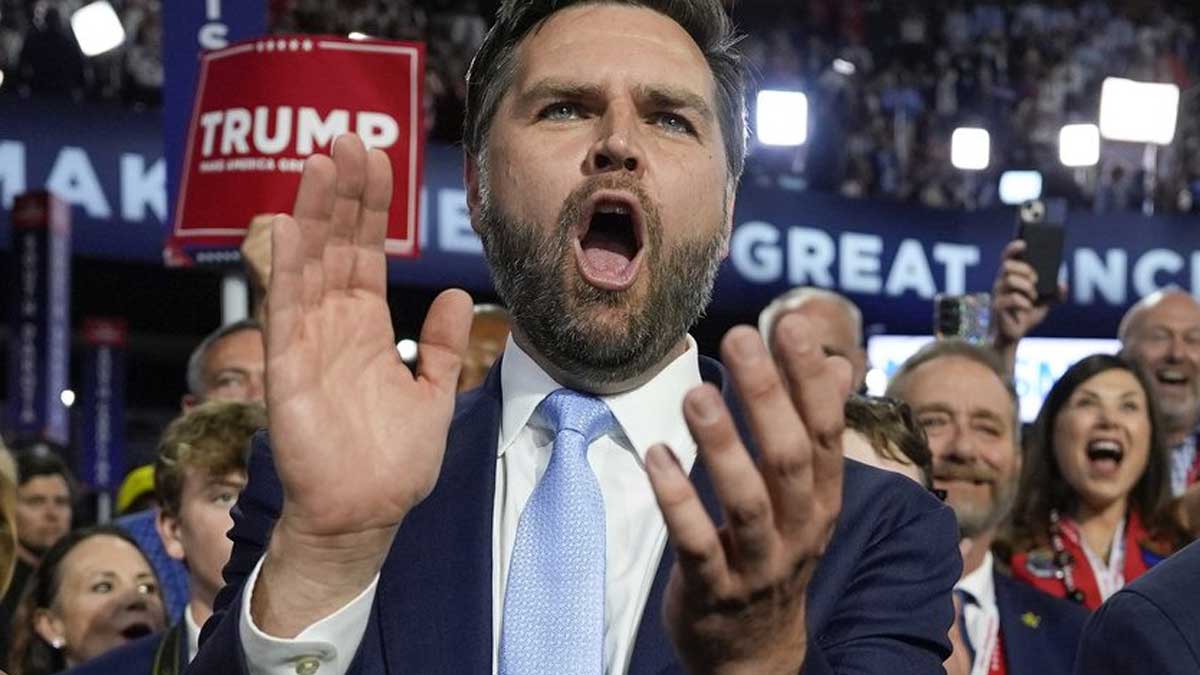- Home
- Billionaires
- Investing Newsletters
- 193CC 1000
- Article Layout 2
- Article Layout 3
- Article Layout 4
- Article Layout 5
- Article Layout 6
- Article Layout 7
- Article Layout 8
- Article Layout 9
- Article Layout 10
- Article Layout 11
- Article Layout 12
- Article Layout 13
- Article Layout 14
- Article Sidebar
- Post Format
- pages
- Archive Layouts
- Post Gallery
- Post Video Background
- Post Review
- Sponsored Post
- Leadership
- Business
- Money
- Small Business
- Innovation
- Shop
Recent Posts
JD Vance Struggles in Polls After Trump VP Nomination

Senator JD Vance, the Republican nominee for Vice President and former U.S. Senator from Ohio, is facing significant challenges in public opinion polls following his announcement as Donald Trump’s running mate. Despite the anticipated boost from his selection and the Republican National Convention, Vance’s favorability ratings have remained uneven, with a considerable portion of the electorate still holding unfavorable views or lacking familiarity with him. This mixed reception underscores the difficulties Vance faces as he seeks to establish his credibility and appeal on the national stage.
The latest Reuters/Ipsos poll, conducted on Monday and Tuesday, highlights a slight improvement in Vance’s favorability ratings. According to the survey, 32% of respondents now view him positively, a modest increase from 24% in the previous week. However, this uptick in favorable impressions is tempered by a rise in his unfavorable rating, which has jumped from 30% to 39%. This shift suggests that while some voters are becoming more acquainted with Vance, their overall impression remains divided, with a notable segment of the electorate expressing disapproval.
In a separate NPR/PBS News/Marist poll, also conducted earlier in the week, 36% of registered voters indicated they were either unsure of Vance’s qualifications or had not heard of him at all. This survey reveals a pronounced partisan divide: 51% of Democrats view Vance unfavorably, reflecting skepticism and negativity from the left, whereas only 11% of Republicans share this view. On the flip side, 57% of Republicans view Vance favorably, contrasting sharply with the 18% of Democrats who hold a positive opinion of him. This divergence highlights the polarized nature of Vance’s appeal across party lines.
Another CNN poll, conducted concurrently with the NPR/PBS survey, compares Vance’s current favorability to his ratings before the Republican National Convention in late June. This poll shows a notable increase in his favorability from 13% to 28%, yet it also reveals a significant rise in his unfavorable rating, from 20% to 34%. Additionally, the percentage of respondents who were previously unfamiliar with Vance has decreased markedly, from 51% to 16%. While the reduction in unfamiliarity suggests that Vance is becoming more well-known, the simultaneous increase in negative opinions indicates that his growing visibility may also be amplifying criticism.
The YouGov poll, conducted over several days from Sunday to Tuesday, provides the most detailed analysis of Vance’s candidacy. This poll delves into various aspects of Vance’s public perception, including his ideological positioning and perceived qualifications. It found that 70% of respondents view Vance as either conservative or moderate. Among Republicans, Vance enjoys a strong 75% favorability rating, with 61% of GOP voters considering him qualified to be President and 74% seeing him as a good choice for Trump’s running mate. This strong support within his own party contrasts sharply with the views of Democrats, who rate him at a mere 8% favorability, with only 15% viewing him as a suitable vice presidential pick and just 7% considering him qualified for the presidency.
Notably, Vance’s performance in the CNN poll positions him as the least popular non-incumbent vice presidential nominee since 1980, with a net negative favorability rating of -6. This indicates that despite the high-profile endorsement from Trump, Vance is struggling to gain widespread acceptance and support among voters.
According to the YouGov poll, 58% of Republican respondents believe Vance will positively impact Trump’s chances of winning the election, compared to only 16% of Democrats who hold this view. Meanwhile, 27% of all respondents feel that Vance’s nomination will have no effect on the election outcome, while only 3% of Republicans think he might harm Trump’s chances, versus 20% of Democrats. This data underscores the polarized perceptions of Vance’s role and the varying expectations of his influence on the campaign.
Donald Trump announced Vance as his vice presidential pick on the first day of the Republican National Convention, praising him as the “best suited” candidate for the role. Prior to Vance’s selection, Trump had considered several other potential candidates, including Senator Marco Rubio, North Dakota Governor Doug Burgum, and Senator Tim Scott. Vance, at 39, is relatively new to national politics, having been elected to the Senate in 2022 with Trump’s endorsement. His initial rise to prominence came from his 2016 memoir, “Hillbilly Elegy.” Before his senatorial campaign, Vance was a vocal critic of Trump, notably not voting for him in 2016 and describing him as “unfit” for the presidency in a New York Times op-ed. However, by 2021, Vance had publicly retracted his earlier criticisms, expressing regret and becoming a fervent Trump supporter. As a senator, Vance has championed Trump’s views, including promoting election fraud theories, advocating for anti-abortion legislation, and opposing continued U.S. support for Ukraine in its conflict with Russia.
Recent Posts
Categories
- 193 Countries Consortium Partner1
- 193cc Digital Assets2
- 5G1
- Aerospace & Defense48
- AI37
- Arts3
- Banking & Insurance11
- Big Data3
- Billionaires1,261
- Boats & Planes1
- Business332
- Careers13
- Cars & Bikes79
- CEO Network1
- CFO Network17
- CHRO Network1
- CIO Network1
- Cloud10
- CMO Network18
- Commercial Real Estate7
- Consultant1
- Consumer Tech194
- CxO1
- Cybersecurity73
- Dining1
- Diversity, Equity & Inclusion4
- Education7
- Energy8
- Enterprise Tech29
- Events11
- Fintech1
- Food & Drink2
- Franchises1
- Freelance1
- Future Of Work2
- Games149
- GIG1
- Healthcare79
- Hollywood & Entertainment203
- Houses1
- India’s 1000 Richest1
- Innovation46
- Investing2
- Investing Newsletters4
- Leadership65
- Lifestyle11
- Manufacturing1
- Markets20
- Media327
- Mobile phone1
- Money13
- Personal Finance2
- Policy569
- Real Estate1
- Research6
- Retail1
- Retirement1
- Small Business1
- SportsMoney42
- Style & Beauty1
- Success Income1
- Taxes2
- Travel10
- Uncategorized13
- Vices1
- Watches & Jewelry2
- world's billionaires1,230
- Worlds Richest Self-Made Women2
Related Articles
South Korea Plane Crash: A Tragic Loss and Global Mourning
The tragic plane crash at South Korea’s Muan International Airport on Sunday...
By 193cc Agency CouncilDecember 30, 2024H-1B Visa Debate Splits Trump Allies and Silicon Valley
The debate over H-1B visas has once again become a contentious issue,...
By 193cc Agency CouncilDecember 28, 2024Trump Moves $4B Stake in Truth Social Parent, Stock Drops 6%
Donald Trump recently transferred his 57% stake in Trump Media & Technology...
By 193cc Agency CouncilDecember 20, 2024House Rejects Trump-Backed Funding Bill, Shutdown Looms
The U.S. House of Representatives rejected a new government funding bill on...
By 193cc Agency CouncilDecember 20, 2024















Leave a comment